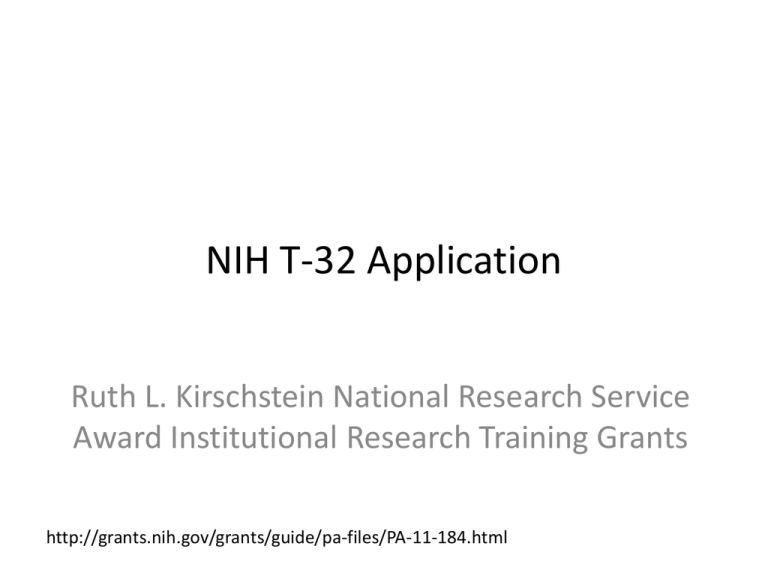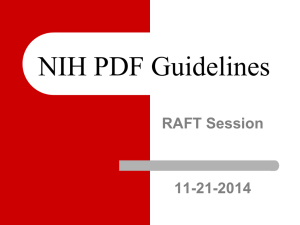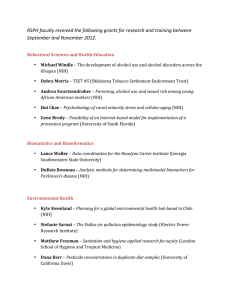NIH T-32 Application Ruth L. Kirschstein National Research Service
advertisement

NIH T-32 Application Ruth L. Kirschstein National Research Service Award Institutional Research Training Grants http://grants.nih.gov/grants/guide/pa-files/PA-11-184.html NIH T-32 Application – PA-11-184 Components of Participating Organizations National Cancer Institute (NCI), (http://www.nci.nih.gov) National Eye Institute (NEI), (http://www.nei.nih.gov) National Heart, Lung, and Blood Institute (NHLBI), (http://www.nhlbi.nih.gov) National Human Genome Research Institute (NHGRI), (http://www.nhgri.nih.gov) National Institute on Aging (NIA), (http://www.nia.nih.gov) National Institute on Alcohol Abuse and Alcoholism (NIAAA), (http://www.niaaa.nih.gov) National Institute of Allergy and Infectious Diseases (NIAID), (http://www.niaid.nih.gov) National Institute of Arthritis and Musculoskeletal and Skin Diseases (NIAMS), (http://www.niams.nih.gov) National Institute of Biomedical Imaging and Bioengineering (NIBIB), (http://www.nibib.nih.gov) Eunice Kennedy Shriver National Institute of Child Health and Human Development (NICHD), (http://www.nichd.nih.gov) National Institute on Deafness and Other Communication Disorders (NIDCD), (http://www.nidcd.nih.gov) National Institute of Diabetes and Digestive and Kidney Diseases (NIDDK), (http://www.niddk.nih.gov) National Institute on Drug Abuse (NIDA), (http://www.nida.nih.gov) National Institute of Environmental Health Sciences (NIEHS), (http://www.niehs.nih.gov) National Institute of General Medical Sciences (NIGMS), (http://www.nigms.nih.gov) National Institute of Mental Health (NIMH), (http://www.nimh.nih.gov) National Institute of Neurological Disorders and Stroke (NINDS), (http://www.ninds.nih.gov) National Institute of Nursing Research (NINR), (http://www.ninr.nih.gov/) Fogarty International Center (FIC), (http://www.fic.nih.gov/) National Center for Complementary and Alternative Medicine (NCCAM), (http://www.nccam.nih.gov) National Center for Research Resources (NCRR), (http://www.ncrr.nih.gov) Office of Dietary Supplements (ODS), (http://ods.od.nih.gov/) NIH T-32 Application – PA-11-184 Release Date: March 25, 2011 Letters of Intent Receipt Date(s): Not Applicable Application Receipt Dates(s): Standard dates apply http://grants1.nih.gov/grants/funding/submissionschedule.htm Peer Review Date(s): Standard dates apply http://grants1.nih.gov/grants/funding/submissionschedule.htm Council Review Date(s): Standard dates apply http://grants1.nih.gov/grants/funding/submissionschedule.htm Earliest Anticipated Start Date: Standard dates apply http://grants1.nih.gov/grants/funding/submissionschedule.htm NIH NRSA T-32 Application – PA-11-184 Overall goal: Help ensure that a diverse pool of highly trained scientists is available in appropriate scientific disciplines to address the Nation's biomedical, behavioral, and clinical research needs. Duration: Up to five years Research training activities: basic biomedical or clinical sciences behavioral or social sciences health services research other discipline relevant to the NIH mission Training Program Director/Principal Investigator (Training PD/PI) selects the trainees develop a curriculum of study and research experiences necessary to provide high quality research training Awards: cost of stipends tuition and fees training related expenses including health insurance for the trainees ss per approved NIH support levels NIH NRSA T-32 Application – PA-11-184 Mentors: • The preceptors/mentors should have: • strong records as researchers • successful competition for research support in the area of the proposed research training program • past record of research training • successful former trainees who have establishing productive scientific careers • Researchers from diverse backgrounds, including racial and ethnic minorities, persons with disabilities, and women are encouraged to participate as mentors. NIH NRSA T-32 Application – PA-11-184 Trainees The individual to be trained must be a citizen or a noncitizen national of the United States or have been lawfully admitted for permanent residence at the time of appointment. All trainees are required to pursue their research training full time, normally defined as 40 hours per week, or as specified by the sponsoring institution in accordance with its own policies. Appointments are normally made in 12-month increments, and no trainee may be appointed for less than 9 months during the initial period of appointment, except with prior approval of the NIH awarding unit, or when trainees are appointed to approved, short-term training positions. Additional details on citizenship, training period, and aggregate duration of support are available in the NIH Grants Policy Statement. Predoctoral trainees must have received a baccalaureate degree by the beginning date of their NRSA appointment, must be training at the post-baccalaureate level, and be enrolled in a program leading to a Ph.D. in science or in an equivalent research doctoral degree program. Health-professional students, graduate students in the quantitative sciences, or individuals in postgraduate clinical training who wish to interrupt their studies for a year or more to engage in full-time research training before competing their formal training programs are also eligible. Postdoctoral trainees must have received, as of the beginning date of the NRSA appointment, a Ph.D., M.D., D.D.S., or comparable doctoral degree from an accredited domestic or foreign institution. Eligible doctoral degrees include, but are not limited to, the following: D.M.D., D.C., D.O., D.V.M., O.D., D.P.M., Sc.D., Eng.D., Dr. P.H., D.N.Sc., D.P.T., Pharm.D., N.D. (Doctor of Naturopathy), D.S.W., Psy.D, as well as a doctoral degree in nursing research. Documentation by an authorized official of the degree-granting institution certifying all degree requirements have been met prior to the beginning date of the training appointment is acceptable. Short term health professional trainees must be medical students, dental students, students in other healthprofessional programs, or graduate students in the physical or quantitative sciences. To be eligible for short-term predoctoral research training positions, students must be enrolled and in good standing and must have completed at least one quarter or semester in a program leading to a clinical doctorate, or a doctorate in a quantitative science such as physics, mathematics, or engineering. Individuals already matriculated in a formal research degree program in the health sciences, or those holding a research doctorate or master’s degree or a combined health-professional/research doctorate normally are not eligible for short-term training positions. Within schools of pharmacy only individuals who are candidates for the Pharm.D. degree are eligible for short-term research training positions. NIH NRSA T-32 Application – PA-11-184 Training Program: A Kirschstein-NRSA institutional research training grant must be used to: - Support a program of full-time research training - Research trainees who are also training as clinicians must devote their time to the proposed research training and must confine clinical duties to those that are an integral part of the research training experience - Program may not be used to support studies leading to the M.D., D.D.S., or other clinical, health-professional training except when those studies are part of a formal combined research degree program, such as the M.D./Ph.D. Similarly, trainees may not accept NRSA support for clinical training that is part of residency training leading to clinical certification in a medical or dental specialty or subspecialty. It is permissible and encouraged, however, for clinicians to engage in NRSA-supported full-time postdoctoral research training even when that experience is creditable toward certification by a clinical specialty or subspecialty board. - Short-term training is not intended, and may not be used, to support activities that would ordinarily be part of a research degree program, nor for any undergraduatelevel training. Short-term positions should be requested at the time of application as described in the NIH Grants Policy Statement. Research training programs solely for short-term research training should not apply to this announcement, but rather the separate T35 NRSA, which can be found in the NIH Training Kiosk.


